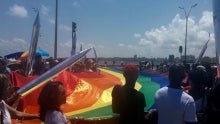On queer communion/Sobre comunión cuir

One month before the massacre at Pulse, I was at a panel on religion at the IX Jornada Cubana Contra la Homofobia y la Transfobia in Havana.[1] I didn’t know what to expect from the event, and I wasn’t prepared for the moving presentation of Reverend Carmen Margarita Sánchez de León of the Metropolitan Community Churches. She talked about a service for trans* people she gave in a church in Brazil. The congregants—mostly working-class Afrodescendants—came as they were, many in short dresses and heels. Instead of Cristos, she told us, they had Cristas.[2] They gathered to share intimately in a space free from shame. They had a queer communion.
I had a moment of queer communion a few days later during the Conga contra la homofobia.[3] Marching down the street, we chanted “Socialismo sí! Homofobia no!” and “De todos los colores, revolución!”[4] Passing through the neighborhood where my grandparents had their first apartment together, my lover and I were called up by a friend to hold a corner of the city-block-large Cuban flag and help usher it in to the Pabellón Cuba[5] before the rest of the day’s events.
Two weeks later—back home in Cambridge, Massachusetts—some friends and I gathered to have brunch and attend the Boston Pride Parade. Ours was a sort of queer communion as we commented on each of the groups that passed by, but the larger event was hard to get in to. Many of the floats belonged to dubious corporations. At one point, we were handed little rainbow flags with TD Bank insignia on them. I felt a painful distance from Havana’s Conga.
I went to bed that night disappointed in displays of queer “pride” in the US, and I woke up to the news that 49 queer sisters and brothers—mostly black and latino—had been slaughtered while I slept. As this reality sank in, I questioned my judgmental attitude the day before, I became enraged at a US culture of violence, and I fell into a deep sorrow.
Like many queer folks, I spent a lot of time in the week following the massacre crying and writing. “In the wake of Orlando, I realize, I’ve been needing queer communion,” I wrote, yearning for a decidedly different communion from the one I participated in, for example, while growing up in the Catholic church.
Queer communion has been, for me, a space of critical reflection and discussion. A space where the privileged status of masculinity is systematically dismantled and where sexuality is understood as a category that is always inflected by—at least—race, class, gender, and ability. Queer communion offered me a tool for survival in incomprehensible times and a method for honoring the lives that were senselessly lost at Pulse.
Notes
[1] 9th Cuban Conference Against Homophobia and Transphobia.
[2] Instead of male Christs, they had female Christs.
[3] Conga Against Homophobia.
[4] “Socialism yes! Homophobia no!” and “Of all the colors, revolution!”
Matthew Leslie Santana is a violinist and a Ph.D. student in ethnomusicology at Harvard University. His work focuses on issues of race, sexuality, and performance in the Americas, particularly Cuba and the United States. Matthew received a DMA and a BM from the University of Michigan and an MM from the Cleveland Institute of Music. His writing has been featured in the web journal Cuba Counterpoints and Revista: The Harvard Latin American Review.





